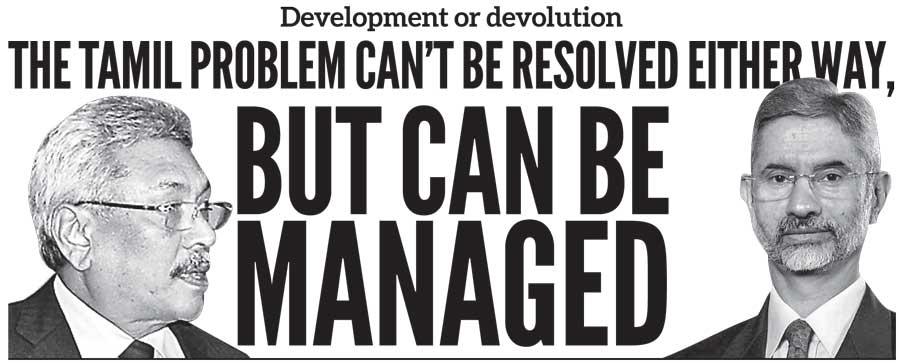Reply To:
Name - Reply Comment

 It seems that President Gotabaya Rajapaksa intends to replace power devolution, a persistent Tamil demand, with development.
It seems that President Gotabaya Rajapaksa intends to replace power devolution, a persistent Tamil demand, with development.
“Devolution of power is a lie and most are opposed to it,” he told a meeting of heads of media organizations recently adding that ‘reconciliation can be achieved through broad development’.
He had echoed the same sentiments previously, at a meeting with Indian External Affairs Minister S. Jaishankar and in at least two
media interviews.
In an interview with Suhasini Haider of the Hindu during his official visit to New Delhi, President Gotabaya said: “For 70 odd years, successive leaders have promised one single thing; devolution, devolution, devolution. But ultimately nothing happened. Full devolution of powers as promised by the 13th Amendment to the Constitution in 1987 could not be implemented “against the wishes and feelings of the majority [Sinhala] community.”
The Tamil political elites had not done much to alleviate the effects of economic deprivation caused by three decades of war, after they were handed power
He added: “No Sinhalese will say, don’t develop the area, or don’t give jobs, but political issues are different.”
This appears to be the de-facto position of the government. It would become its official position after the General election, (the result of which is not too difficult to guess).
But, how effective will development be as a solution to the ethnic question though?
Few commentators have cast doubts on the efficacy of the presidential remedy.
As M.S.M. Ayub had written in these pages last week, “The notion that a higher degree of devolution will solve the issues facing Tamils is in their blood.”
Elsewhere, Prof Ameer Ali surmises, “Even if economic inclusion allows minorities to prosper, it does not mean that minorities, and especially the Tamil minority, would like to remain politically excluded. It is economic prosperity that enables people everywhere to rise up and demand participation in governance”.
Though his temptation in the article to blame the Sinhalese for everything wrong in the country feeds into polarization and makes it a partisan reading, Prof Ali nonetheless
has a point.
Development as a stand-alone solution would not work. Probably, it would make things worse and skew the current status quo.
That is because it overlooks the elephant in the room of all causes. The Tamil political struggle was not so much about discrimination or economic deprivation -- these maladies came to define the Northern life only after the Tamil leadership unleashed a suicidal madness that cannibalized its own children and then bombed the rest of the country.
Tamil political struggle has always been about political aspirations emanating from Dravidian/ Tamil nationalism. These aspirations were subsequently repackaged as grievances for ease of sale to the receptive audience. Nonetheless, in its essense, Tamil nationalist struggle is for a separate nation in the North East, identified as Tamil homeland and entitled to self-determination. Understandably enough, the Sinhalese majority have historically viewed these aspirations as incompatible with national interests. That the Tamil elites who advanced those goals resorted to India to ‘intimidate’ Colombo, and that they, at best, had split loyalties did not inspire public confidence.
Exactly due to the socio-cultural dynamism of Dravidian civilization, which stands for a Tamil exceptionalism, Sri Lankan Tamil elites had a problem with coming to terms with the demographic reality in the country, long before it received independence. Northern elites boycotted the first State Council elections in 1932. Though the Gandhian youth who pioneered the boycott called for full independence, cannier Tamil political elites had less noble grievances of losing their traditional privileges to a larger Sinhalese population who were empowered by the universal suffrage introduced under the recommendations of the Donoughmore Commission.
It was the same calculations that were behind G.G. Ponnambalam’s 50-50 proposal.
Those demands grew in intensity long before the Sinhala Only Act, though the latter itself contributed to the hardening of the Tamil position.
Throughout the past 70 years, the mainstream Tamil leadership eschewed national politics or responsibilities in the government. Though the contemporary TNA leadership had shown a lot more maturity than their over-hyped predecessors.
This political behaviour should be contrasted with that of other minorities, Muslims and Tamils of Indian Origin, whose leaders have always opted for a role in the Central government and also to incrementally advance the positions of their communities.
Economic deprivation, if any, was hardly a factor in the Tamil nationalist campaign.
When Jaffna erupted in ethnic rage and terrorism in the early 80’s, it was the second richest city in the country. Early claims of ethnic discrimination were indeed a political ploy aimed at mass mobilization.
In the first half of the 80s, the Chief justice, IGP, and Attorney General were all Tamils. One-third of administrative service, lawyers, and accountants were also Tamils.
The Tamil political elites had not done much to alleviate the effects of economic deprivation caused by three decades of war, after they were handed power.
When the provincial councils in the North and the East finally came into being after a long delay, much energy was wasted, especially in the Northern assembly to advance rhetorical partisan agendas. Regional development was never a priority.
Would development and economic prosperity assuage the cry of Tamil nationalism?
Probably not. Take for instance the ethno-nationalism in the rich world. Catalonia is the richest province of Spain and is accorded with enhanced devolution of power, yet it still voted for independence in an unofficial referendum. Elsewhere, Scottish nationalists are contemplating a second referendum for independence.
Whereas, relative economic deprivation could even serve as a monetary deterrent for the worst of ethnic nationalist mobilization, though that as a solution is immoral and can have dangerous side effects however, any effort to cultivate economic inter-dependency between the North and Tamil Nadu, at the expense of Colombo would be a recipe for a long
term disaster.
Then, would devolution be the solution? A better question would be how much of devolution is the solution? Given the historical tendency of Tamil nationalism, an all-out devolution, including land and police powers could more likely unleash an era of confrontation with the Centre than cooperation. And perceived grievances emanating from that confrontation would then be used to public mobilization, leading to a spiral of nationalist rage on both sides.
The unpalatable truth is that intractable problems like Sri Lanka’s Tamil problem can not be resolved. But they can be managed.
Therefore the emphasis should be the management of the problem to prevent it from becoming a distraction from other national priorities or a looming national security threat.
Countries as wide-ranging as Turkey, Russia and Singapore have done that, some with an iron fist, others with a velvet glove on it.
Sri Lanka should find its mixture of strategies. Development is, of course, part of it. So is a degree of devolution that is not designed to undermine the Centre. Rule of the law should be empowered. Language rights of Tamil speakers, enshrined in the Constitution, should be given their practical expression, Deficiencies there lie in administrative measures.
However, there is more to this. If there is a carrot, there has to be a stick. Security forces and intelligence agencies would have a role in keeping a tab so that, relative freedoms would not be used to mobilize a new phase of suicide terrorism. At the moment, it is the collective appreciation of the insurmountable loss of the previous misadventure that serves as the biggest deterrent against the revival of the worst forms of Tamil nationalism. Any alternative that replaces the current status quo should not skew it.
Follow @RangaJayasuriya on Twitter